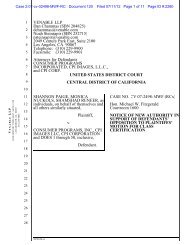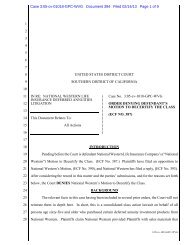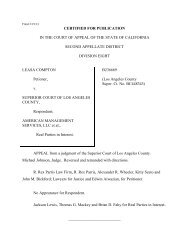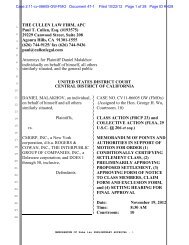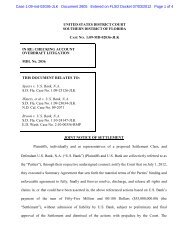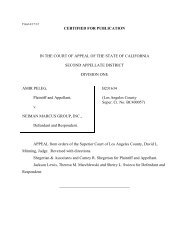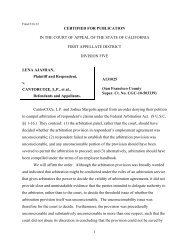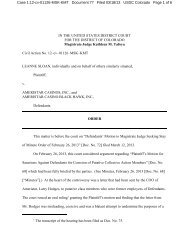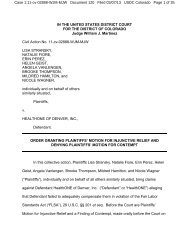KYLE PIPPINS, JAMIE SCHINDLER, and EDWARD LAMBERT
KYLE PIPPINS, JAMIE SCHINDLER, and EDWARD LAMBERT
KYLE PIPPINS, JAMIE SCHINDLER, and EDWARD LAMBERT
Create successful ePaper yourself
Turn your PDF publications into a flip-book with our unique Google optimized e-Paper software.
2012 U.S. Dist. LEXIS 949, *; 18 Wage & Hour Cas. 2d (BNA) 1179<br />
Page 2<br />
("KPMG"). On April 6, 2011, Plaintiffs filed this motion<br />
seeking conditional class certification, court-authorized<br />
notice pursuant to section 216(b) of the FLSA, <strong>and</strong> an<br />
order directing KPMG to produce contact information<br />
for current <strong>and</strong> former KPMG employees holding [*3]<br />
the position of either Audit Associate or Audit Associate<br />
Second (collectively, "Audit Associates"). KPMG opposes<br />
both the collective certification <strong>and</strong> Plaintiffs'<br />
proposed notice. For the reasons stated below, the motion<br />
to certify the collective action is GRANTED, <strong>and</strong><br />
the form of notice is approved, but with the Court's modifications.<br />
I. Background<br />
A. The Parties<br />
Plaintiffs in this suit were employed by KPMG as<br />
Audit Associates. Plaintiffs worked at KPMG offices in<br />
six different states: Florida, Nebraska, New Jersey, New<br />
York, Texas, <strong>and</strong> Washington.<br />
KPMG is an audit, tax, <strong>and</strong> advisory firm that provides<br />
its services through its 87 offices across the United<br />
States. KPMG is one of the so-called "Big Four" accounting<br />
firms, along with Deloitte, Ernst & Young, <strong>and</strong><br />
PricewaterhouseCoopers.<br />
B. The Purported Class<br />
Pending before the Court is Plaintiffs' motion for<br />
conditional certification of a collective action under section<br />
16(b) of the FLSA, which permits employees to<br />
bring actions seeking recovery of unpaid overtime wages<br />
on behalf of "themselves <strong>and</strong> other employees similarly<br />
situated." 29 U.S.C. § 216(b). Plaintiffs seek to conditionally<br />
certify a class consisting of themselves <strong>and</strong><br />
"similarly [*4] situated current <strong>and</strong> former KPMG Audit<br />
Associates whom KPMG classified as exempt" from<br />
the FLSA's overtime wage provisions. (First Am. Compl.<br />
6.) Plaintiffs argue that Audit Associates at KPMG<br />
were misclassified as exempt employees, <strong>and</strong> so were<br />
improperly denied overtime wages.<br />
The primary job function of an Audit Associate is to<br />
perform audits of KPMG's customers' financial records.<br />
(Swartz Decl. Ex. A ("Pippins Decl.") 2; Ex. B<br />
("Schindler Decl.") 2; Ex. C ("Bradley Decl.") 2; Ex.<br />
D ("Lambert Decl.") 2; Ex. E ("Young Decl.") 2.)<br />
"The objective of a financial statement audit is to obtain<br />
reasonable assurance that [a company's] financial statements<br />
are free of material misstatements, <strong>and</strong> to issue an<br />
audit report." (Opp'n at 5.)<br />
KPMG's Audit Associates are solicited <strong>and</strong> hired<br />
based on uniform job descriptions responsibilities, <strong>and</strong><br />
qualifications. (See Swartz Decl. Ex. G.) These qualifications<br />
do not require that applicants hold a CPA, but do<br />
require that they be "CPA eligible" <strong>and</strong> have experience<br />
in auditing, as well as an applied working knowledge of<br />
accounting rules <strong>and</strong> procedures. (Id.) In addition to<br />
common job descriptions used to solicit potential Audit<br />
Associates, KPMG [*5] maintains a uniform job description<br />
for all its Audit Associates, wherever they<br />
work. (Butler Decl. Exs. A & B ("Uniform Job Descriptions").)<br />
Audit Associates must perform their duties in<br />
accordance with the KPMG Audit Manual -- US (the<br />
"KAM -- US"), which explains that: "KPMG has a number<br />
of policies <strong>and</strong> other requirements relating to the way<br />
its audits are carried out, <strong>and</strong> that those policies <strong>and</strong> other<br />
requirements are to be complied with when conducting<br />
[an] audit." (Swartz Decl. Ex. F ("2008 Audit Workbook<br />
Supplement") at 1.) The KAM - US is accessible to all<br />
Audit Associates on their computers. (Id. at 1.)<br />
Once hired, all Audit Associates receive the same<br />
training during a week-long orientation. (Pippins Decl.<br />
26-31; Schindler Decl. 26-30; Bradley Decl. <br />
26-31; Lambert Decl. 26-31; Young Decl. 25-30;<br />
Swartz Decl. Ex. H ("Litchfield Decl.") 44-45; Opp'n<br />
at 11-12.) During this training, KPMG describes the<br />
process for conducting a KPMG customer audit from<br />
beginning to end. (See Pippins Decl. 28; Schindler<br />
Decl. 27; Bradley Decl. 28; Lambert Decl. 27;<br />
Young Decl. 27; Litchfield Decl. 44.) While KPMG<br />
states that it offers a variety of supplemental training<br />
[*6] courses, (Opp'n at 11-12), Plaintiffs claim that they<br />
did not have to undergo any additional training when<br />
moving between clients, or from the job title of Audit<br />
Associate to Audit Associate Second (see, e.g., Pippins<br />
Decl. 31.)<br />
After their orientation training, every Audit Associate<br />
is assigned to a KPMG team that is tasked with<br />
providing auditing services to a KPMG client. Audit<br />
Associates are the most junior KPMG employees on<br />
these teams, which typically consist of an Audit Associate,<br />
an Audit Associate Second, one or more Senior Audit<br />
Associates, one or more Project Managers, <strong>and</strong> one or<br />
more Partners. (See Pippins Decl. 10; Schindler Decl. <br />
10; Bradley Decl. 10; Lambert Decl. 27; Young Decl.<br />
27; Litchfield Decl. 8.) Plaintiffs claim that they were<br />
"never free from the immediate direction or supervision<br />
of the senior members" of their teams. (Pippins Decl. <br />
11; Schindler Decl. 11; Bradley Decl. 11; Lambert<br />
Decl. 11; Young Decl. 11; Litchfield Decl. 8, 23,<br />
47, 49-52.) Supporting these statements, KPMG's Uniform<br />
Job Descriptions state that Audit Associates are to<br />
conduct a self-review of their work prior to "senior associate<br />
or managerial review." (Uniform Job Descriptions<br />
at 3.)<br />
Plaintiffs' [*7] primary duties consist of "conducting<br />
basic reviews of client document <strong>and</strong> financial records,<br />
conducting inventory counts, photocopying client



